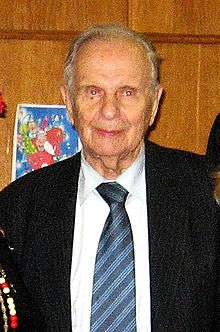Platon Kostiuk
Platon Hryhorovych Kostyuk (Ukrainian: Платон Григорович Костюк) (20 August 1924 – 10 May 2010) was a Ukrainian physiologist, neurobiologist, electrophysiologist, and biophysicist. He was a member (academician) of the National Academy of Sciences (NAS) of Ukraine and the Russian Academy of Sciences. He was also a director of the Bogomoletz Institute of Physiology and the International Center of Molecular Physiology NAS of Ukraine; chair of the Moscow Institute of Physics and Technology, Kiev branch, vice-president of the NAS of Ukraine, and chairman of the Verkhovna Rada of the Ukrainian SSR.[1][2]
Platon Kostyuk
Платон Костюк | |
|---|---|
 | |
| Born | 20 August 1924 |
| Died | 10 May 2010 (aged 85) |
| Citizenship | |
| Alma mater |
|
| Spouse(s) | Lyudmyla Kostyuk (1929–2011) |
| Children | Olena (1957–2011) Olga (1966) |
| Awards | |
| Scientific career | |
| Fields | Physiology |
| Institutions | |
| Thesis | Nerve adaptation to expanding current (1949) |
| Doctoral advisor | Danylo Vorontsov |
Platon Kostiuk | |
|---|---|
| Chairman of the Supreme Soviet of the Ukrainian SSR | |
| In office 1985–1990 | |
| Preceded by | Kostiantyn Sytnyk |
| Succeeded by | Vladimir Ivashko |
Biography
Platon Kostyuk was born in Kiev to the family of the Ukrainian psychologist Hryhoriy Kostyuk. A native speaker of both Ukrainian and Russian, Kostyuk studied English and German, and graduated from high school when the German–Russian War began in 1941. Kostyuk entered Stalingrad University to study biology and Roman philology. He was later evacuated to Siberia where he studied medicine till 1945. After half a year of military medical service, he was demobilized for entry into the Department of Biology at Kyiv University. In parallel he studied psychiatry at Kyiv Medical Institute. Kostyuk worked on his doctoral thesis in Danylo Vorontsov's laboratory of physiology. In his research, he developed microelectrode equipment independently of Judith Graham Pool and Ralph W. Gerard (1949). He completed his doctoral thesis in 1957. In 1958, Kostyuk became Head of the Department of General Nervous System Physiology at the Bogomoletz Institute of Physiology. From 1969 to 2010, he served as the director of the institute.[3]
In 1960–61, Kostyuk was invited to John Eccles' Laboratory in Canberra, Australia to study the mechanisms of synaptic inhibition in the spinal cord. In 1974, he was elected a member (academician) of the Soviet Academy of Science. In 1975–1988, he was the academician-secretary of the Section of Physiology of the academy. In 1975–1990, he was also a deputy in the Verkhovna Rada of the Ukrainian SSR and in 1985–90 was its chairman.
Research
Platon Kostiuk was the first to introduce microelectrode studies of the nervous system in the USSR.[4] He was the first to prove directly the presence of calcium channels in neuronal cell membranes.[5] Under his supervision, two types of calcium currents were discovered: high-voltage activated and low-voltage activated.[6] He also proposed an original hypothesis on calcium channels' selectivity mechanism.[7]
Awards and chairs
Kostiuk was a vice-president of the International Union for Physiologycal Sciences from 1989–1993.[8]
In 1966 he was elected a Member of the German Academy of Sciences Leopoldina.[9]
In memoriam
Kostiuk students established Kostyuk Foundation to support young scientists and promote physiological research in Ukraine. Once a year Foundation presents Kostyuk Award to outstanding young researchers in field of biomedical sciences.[10]
Publications
He published more than 1000 scientific papers in Ukrainian, Russian, and English. Some of the most important include:
- Kostyuk, P. G.; Eccles, J.С.; Schmidt, R. F. (1962). "Central pathways responsible for depolarization of primary afferent fibres". J. Physiol.(Gr.Brit.). 65 (2): 237–257.
- Kostyuk, P. G.; Araki, T.; Ito, M.; Oscarsson, O. (1962). "Injection of alcaline cations into cat spinal motoneurones". Nature. 196 (4861): 1319–1320. doi:10.1038/1961319a0.
- Kostyuk, P. G.; Krishtal, O.A.; Pidoplichko, V.I. (1975). "Effect of internal fluoride and phosphate on membrane currents during intracellular dialysis of nerve cells". Nature. 257 (2): 691–693. doi:10.1038/257691a0.
- Kostyuk, PG; Molokanova, EA; Pronchuk, NF; Savchenko, AN; Verkhratsky, AN (December 1992). "Different action of ethosuximide on low- and high-threshold calcium currents in rat sensory neurons". Neuroscience. 51 (4): 755–8. doi:10.1016/0306-4522(92)90515-4. PMID 1336826.
References
- "Platon Kostyuk. FEPS.org" (PDF). Archived from the original (PDF) on 2010-06-02. Retrieved 2014-04-23.
- Compiled by Jack L. Cross (1995). The Ukrainian Academy of Sciences (PDF). Austin, Texas: Cross Associates. OCLC 34218792.
- Bregestovski, P. (2011). "Platon G. Kostyuk (August 20, 1924-May 10, 2010): A unique survey of a life spanning turbulent times". Journal of physiology, Paris. 106 (5–6): 316–320. doi:10.1016/j.jphysparis.2011.11.006.
- Platon Grigor’evich Kostiuk. The Great Soviet Encyclopedia, 3rd Edition (1970-1979)
- P. G. Kostyuk, O. A. Krishtal and Yu A. Shakhovalov (September 1, 1977). "Separation of sodium and calcium currents in the somatic membrane of mollusc neurones". The Journal of Physiology. 270: 545–568.
- Richard W. Tsien and Curtis F. Barrett (2005), "A Brief History of Calcium Channel Discovery", in Gerald Zamponi (ed.), Voltage-Gated Calcium Channels (PDF), Eurekah.com and Kluwer Academic/Plenum Publishers, pp. 27–47
- Kostyuk, P. G., Mironov, S. L., and Shuba, Y. M. (1983). "Two ion-selecting filters in the calcium channel of the somatic membrane of mollusc neurons". Journal of Membrane Biology. 76: 83–93. doi:10.1007/bf01871455.CS1 maint: multiple names: authors list (link)
- Ole H. Petersen (1 December 2009). "The International Union of Physiological Sciences. IUPS Editorial VIII". Physiology. 24 (6): 320–321. doi:10.1152/physiol.00035.2009. PMID 19996362.
- http://www.leopoldina.org/en/members/list-of-members/member/31/
- Kostyuk Foundation
External links
- Platon Kostyuk on a NeuroTree
- Platon Kostyuk on a Chemistry Tree
- Helmut Kettenmann. Platon Gregorievich Kostyuk (1924-2010) in memoriam. FENS News, 17 May, 2010
- Verkhratsky, Alexei; North, R. Alan; Petersen, Ole H.; Krishtal, Oleg (2010). "In memoriam: Platon Kostyuk (1924–2010)". Cell Calcium. 48 (1): 91–93. doi:10.1016/j.ceca.2010.07.003. ISSN 0143-4160.
-->
| Preceded by Kostiantyn Sytnyk |
Chairman of the Verkhovna Rada of the Ukrainian SSR 1985 - 1990 |
Succeeded by Vladimir Ivashko (acting) |
